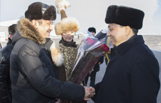Analysts look for 7 percent growth in China, more interest in US real estate
By PAUL WELITZKIN in New York (China Daily USA) Updated: 2015-01-07 09:14China will reach its desired growth target in 2015 and Chinese investors will continue to seek commercial real estate in top US cities like New York to diversity their investment portfolios, according to analysts from Prudential Financial Inc.
As for the world economy this year, the observers said at the financial services company's 2015 Global Economic and Retirement Outlook on Tuesday in New York that the US will become the global beacon in 2015 amid a very slow recovery in Europe and Japan.
China's GDP growth is expected to slow this year to 7.1 percent from an estimated 7.4 percent in 2014, according to a working paper written by a group of economists at the People's Bank of China (PBOC), the country's central bank.
If indeed China's growth comes in at 7 or 7.1 percent, the rest of the world will breathe a sigh of relief, said John Praveen, managing director and chief investment strategist at Prudential International Investment Advisers. "They will see it as a sign that China is stable and that the economy will not flat line. There has been a fear that China's economy is weaker than the numbers indicate.”
Even with 7 percent growth, Praveen expects the PBOC to implement a stimulus package this year "to make sure the floor is solid on the Chinese economy,"he told China Daily.
The main concern about China's economy this year and in 2014 is the slump in the real estate sector. Slowing sales and fading construction threatens to hit demand for everything from steel to furniture.
"Real estate has always been a concern,"noted Praveen. "I expect that the PBOC will attempt to address this by having some bad real estate loans packaged and sold off. That way they will get the bad loans off the books of the lenders.”
Robert Tipp, the chief investment strategist at Prudential Fixed Income, said what will be important is "what does the 7 percent generate in terms of production and how will it affect commodities. The rest of the world will be closely watching what China makes and exports this year.”
What will not change in 2015 is Chinese interest in commercial real estate in top US cities like New York, San Francisco, Los Angeles and Boston, according to Prudential analysts.
Marc Halle, managing director of Prudential Real Estate investors, said as China loosens controls on the outflow of investment capital from the country, investors will continue to seek properties in top tier US cities.
Halle pointed to the purchase last year of New York's venerable Waldorf Astoria Hotel by China's Anbang Insurance Group Co for $1.95 billion.
"Real estate is all about supply and demand. There is no more space on Park Avenue for another Waldorf. The Chinese are very comfortable making long-term investments in trophy real estate in places like New York, Washington and Boston. I don't see that changing this year,"he said.
When the Anbang purchase is completed, Chinese investors will have spent $2.7 billion on New York-area real estate in 2014, exceeding 2013's total by $100 million, according to Real Capital Analytics Inc, a research firm that tracks commercial real estate sales.
Halle said it's not just the Chinese who are interested in US commercial real estate. "Investors from the Middle East, Russia and Japan are also keen on US real estate. They see it as a way to hedge their investment portfolio.”
Lee Menifee, the head of Americas Investment Research at Prudential Real Estate Investors, expects the Chinese to be active buyers in 2015. "I expect continued Chinese interest in properties in the major US markets this year. And even if interest rates go up in the US this year as many predict, I don't think it will dampen Chinese interest,"he said.
Prudential analysts are predicting moderate global economic growth this year paced by the US as gross domestic product is expected to rise about 3 percent.
Despite the US stock market run-up in 2014, Edward Keon, managing director of Prudential's Quantitative Management Associates, believes the US market still has room to expand this year. "In the short run, stocks can continue to perform well as low interest rates support higher valuations. I wouldn't be at all surprised to see that the overall confidence in the US economy is a lot stronger in the next 12 months."
paulwelitzkin@chinadailyusa.com






